Assassin's Creed 3 Review

Key Features
- Developer: Ubisoft Montreal
- Publisher: Ubisoft
- Platforms: Xbox 360, PlayStation 3 [tested], Wii U, Microsoft Windows
- Release date: 31 October, 30 November (Wii U)
- Price: £39.99
Assassin's Creed III
Connor Kenway is a disgusting brute. His early years, which double as Assassin's Creed III's tutorial section, are spent skinning deer for the Kanien'gehaga tribe. Later, as an assassin, his fighting style is upright and aggressive, more closely resembling Bill the Butcher than Ezio Auditore's Errol Flynn.
Kenway is different from his ancestor. Where Ezio had a boyish, swashbuckling charm to him, Connor is a sexless, humourless murderer, tracking British Loyalists with the same steely pragmatism he used to stalk elk. He's unshakeable, in a bad way. Kill after kill, Connor's targets insist they're innocent. But he won't listen; fired up with Assassin propaganda, Connor's preferred way of dealing with the Templars is his homemade Tomahawk. He's an unreliable narrator, more developed than Altair's near-mute hero, and flawed in ways that the handsome, bumbling Ezio never was.
But he's not Assassin's Creed III's main character. America, circa 1770 is the game's central focus, drawing on a range of emotions that Kenway's performance can't hope to match. Creed's New World is an appropriately grubby Eden - the glistening, snow-bound Frontier resembling a paradise on Earth as yet to be ruined by man.
The cities, too, are part beauty, part decay, up-and-coming failures that are sad to walk around. Boston is a bustling port city, scored by the beating drums of Loyalist patrols; New York, which you'll get to later, is much more picturesque. Compared to Rome, or Acre, Assassin's Creed III's population zones are undeveloped, with Boston especially resembling a mining town more than a bona fide city.
They echo a tension that runs through Assassin's Creed III. Characters want to change events that have already happened. Connor wants to preserve his tribe's land; the Templars want to kill George Washington; the British are determined to hold the New World. Boston and New York are similarly ill-fated, optimistic parishes doomed to become urban jungles.
Melancholic
Assassin's Creed III is a melancholic game, similar in tone to Red Dead Redemption and its dying American West. Even the Frontier looks similar to West Elizabeth, snowy and brown in some places, blindingly sun lit and green in others. The countryside, not the gloomy townships make for Assassin's Creed III's best vistas and moving around the Frontier is one of the game's joys.
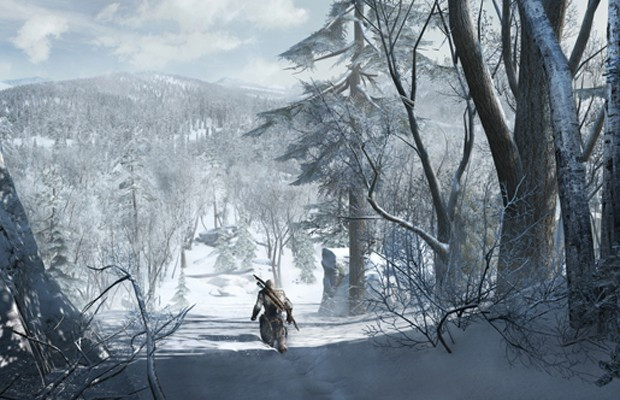
You can fast travel if you like, but the excellent tree-running mechanics make walking there a lot more fun. Elsewhere, the parkour is as per-Creed. You'll find yourself running and climbing onto things you don't mean to, sometimes cramping your style, occasionally screwing your mission completely.
When you're trying to sneak up on a guard, and Connor keeps perching on a barrel or leapfrogging over bollards, it's never long before you get noticed, and in sections where it's mandatory that you remain unseen, niggles like that become a major issue. Stealth is not, and never has been Assassin's Creed's strong point. Its combination of fanickity free-running and unpredictable guard behaviour means that, despite optional objectives inviting you to do otherwise, killing your way through a mission is usually the best idea.
But at least that approach gives you lets you play with the combat; a violent mish-mash of textbook swordsmanship and bar brawling. Connor fights dirty, yanking muskets out of redcoat's hands before pummelling their heads with his axe. Blood goes everywhere in Assassin's Creed III, drenching Kenway's pristine cloak and dripping from the faces of his victims. It's such a violent game, the many combat scenes punctuated by thuggish rabbit punches and cheap stabs.
Ecosystem
Free-running and combat work magnificently. But elsewhere, the game is shambolic, piling feature after new feature on top of your to-do list until you can't help but lose track of what's going on, and where.The Courier missions and collectible feathers return from Assassin's Creed II, and there's still a Homestead, but it's now can upgraded via an awkward system that involves much more micro-management.
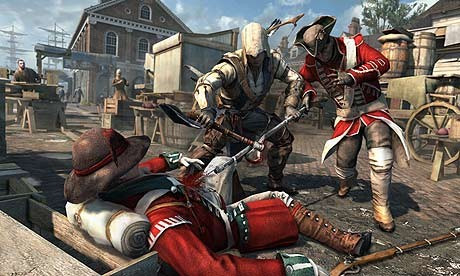
Rescuing craftsman, lumberjacks and cloth weavers from trouble in the Frontier will recruit them to work on the Homestead. You can then commission them to make goods for you, the value of which fluctuates depending on tax rates. Those tax rates depend on Templar and British influence in the area, which in turn is decided by how many Templar strongholds you've personally liberated and how many other side-missions you've completed. It's an intriguing kind of ecosystem, no doubt intended to reflect the enormity of tax issues in 18th century America. But it's difficult to use and wrapped up in too many menus to feel worth the time.
There are also viewpoints to discover, boxing clubs to join; mail to deliver, recipes to craft, treasure to hunt; Frontiersmen to talk to, forts to liberate, Almanac pages to find and animals to hunt. Assassin's Creed III is badly paced, shovelling information and features on top of each other until your mini-map is more icons than geography. It's a shame, too, because they're all good fun on their own. Assassin's Creed III puffs itself up with extra missions until it's big enough to scare you off. It's a bloated game - potentially a victim of feature creep - that would work much better if it were half its size.
The Aqulia
The best of Assassin's Creed III's optional sidequests are the naval missions, which are impressive and deep enough to warrant a game of their own. Where Ubisoft fails to translate the Revolutionary tax system, it's nailed the Maritime vibe.
Connor's galleon, the Aquila, is staffed by bellowing seadogs with thick, northern accents, that make your spine tingle every time they yell "go to half sail." The ship dips and banks with queasy believability, saltwater, rain and wind pelting the decks with every turn of the rudder. You can almost smell the silt.
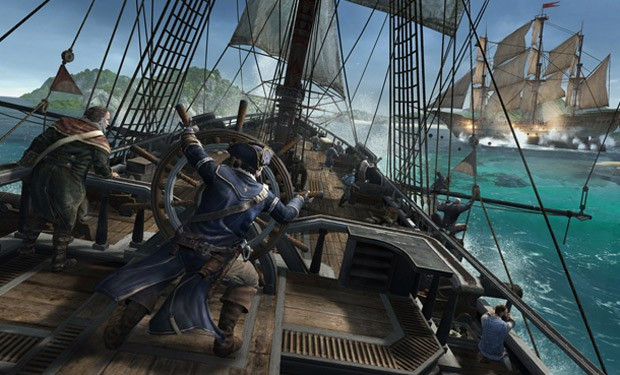
Naval engagements are long, terrifying things, the endless boom of your and your opponent's cannons barely masking the cries of wounded deckhands, and Connor's repeated orders to fire and take cover. Different makes of cannon and chain shot can be used to split your enemy's masts, or tear his hull open, exposing the gunpowder store to your swivel guns.
It's frantic and savage, calling on your driving, RTS and killing skills all in one loud and densely atmospheric moment. The only complaint is that naval warfare isn't better integrated into Assassin's Creed III's narrative. There are occasions when the main story takes to the sea, but for the most part, the Aquila is accessed by an optional map marker.
Cluttered narrative
That said, bundling naval missions into Assassin's Creed III's already cluttered narrative would only have exacerbated the problem.
Characters come and go with incomprehensible frequency, barely giving you time to learn their names. The story moves too quickly, too, skipping forward years at a time without you even noticing. It's a necessary conceit considering the timescale of the Revolutionary War, but Assassin's Creed III is nevertheless confused by too many loading screens and flash-forwards. It's hours before the game settles into one time period, pushing through the opening years of the Revolution with cut scenes and only small, unfulfilling drips of actual gameplay.
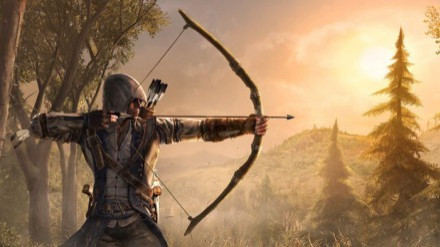
But the characters are superbly acted and very well-written. Ubisoft does a fantastic job of landing its punches, honestly painting historical figures as equally iconic and humane. George Washington is an excellent example. Undoubtedly one of the game's more stand-up guys, he's nevertheless disregarded by the other characters as a chancer and poser, his embarrassing military history regularly dragged up by the people around him.
Sam Adams, too, is a bit of a user, manipulating Connor into doing the Sons of Liberty's work. Charles Lee and John Pitcairn are wonderfully reworked as American Templars, devious but charismatic in equal measure. Even they, the quote-unquote bad guys never descend into plain evil, carrying off an emotional complexity befitting of the incredibly complex period.
The only downside is that Connor too often finds himself on the American side. Given his brutish nature, and Assassin's Creed III's general reluctance to pick sides in the Revolutionary War, it's a pity that Connor often finds himself fighting the redcoats. One scene in particular, where you, as Connor are literally throwing tea into the ocean at the Boston Tea Party, irreparably compromises the game's impartiality.
Flawed epic
The whole game is something of a flawed epic, echoing movies like Alexander and Revolution. There is so much greatness on show in Assassin's Creed III, so much to admire and talk about. And even its main problems aren't its own; the parkhour and stealth gameplay issues are the same ones that plagued Assassin's Creed II.
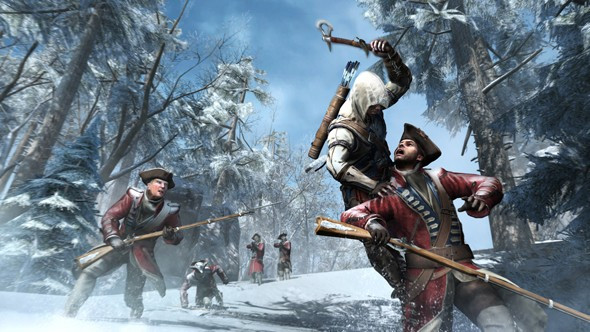
But there are also missteps in the structure and pacing of Assassin's Creed III, burying some excellent writing under unnecessary features and perhaps, too much research. The Animus database constantly sends you articles on the buildings, people and events surrounding Assassin's Creed III, and although they flesh the history out satisfyingly, details like these ought to be woven naturally into dialogue and aesthetics, or not at all. It's still a wonderful game. It's gorgeous to look at, fun to play and has enough atmosphere and dramatic flourishes to make it worthy of your full attention.
Hugely entertaining
In our interview with creative director Alex Hutchinson, he lists getting Assassin's Creed III finished as one of his proudest achievements. It's an enormously ambitious game, with unparalled dramatic scope. Flaws aside, the sheer amount of time, effort and work gone into making Assassin's Creed III (600 people have come and gone from the development team, over three years) makes it one of the most impressive and commendable videogames of the entire seventh generation.
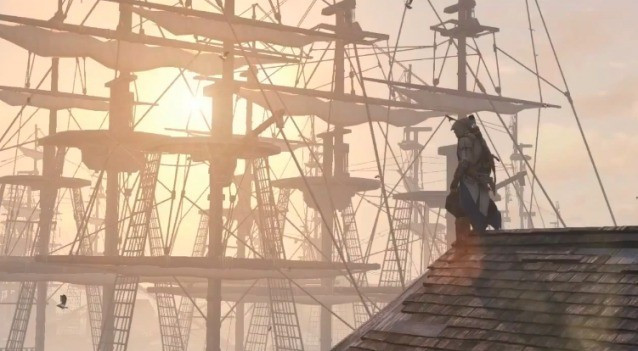
This is a brave, spectacular and hugely entertaining AAA epic, stoppered only by some poor design choices that you can be sure were not left in because of oversight. An enormous achievement that demands to be appreciated, Assassin's Creed III will endure as a beacon of what videogames can be.
Though just as flawed as its leading man, Assassin's Creed III is revolutionary.
Scores
- Gameplay - 7/10: Awkward stealth and too many features made up for by great combat
- Sound - 9/10: Amazing voice acting, spoiled only by a script that occasionally gets cluttered but is otherwise superb
- Graphics - 9/10: Gorgeous. Even the occasional glitches and bugs can't ruin how Assassin's Creed looks
- Replay Value - 8/10: There is loads to do. You won't get bored
- Overall - 8/10: This is one of the smartest and boldest games ever made, hampered only by some glaring technical errors and narrative missteps.
© Copyright IBTimes 2025. All rights reserved.






















